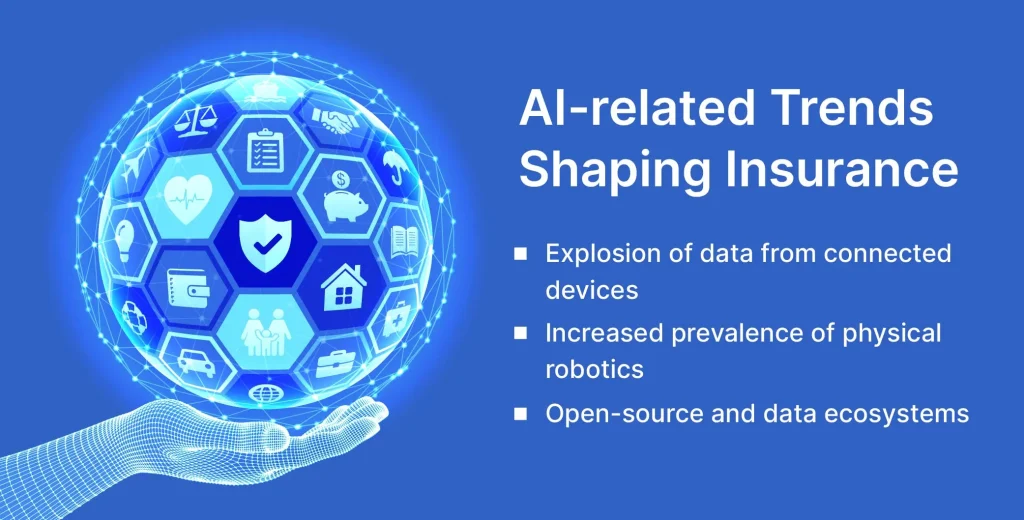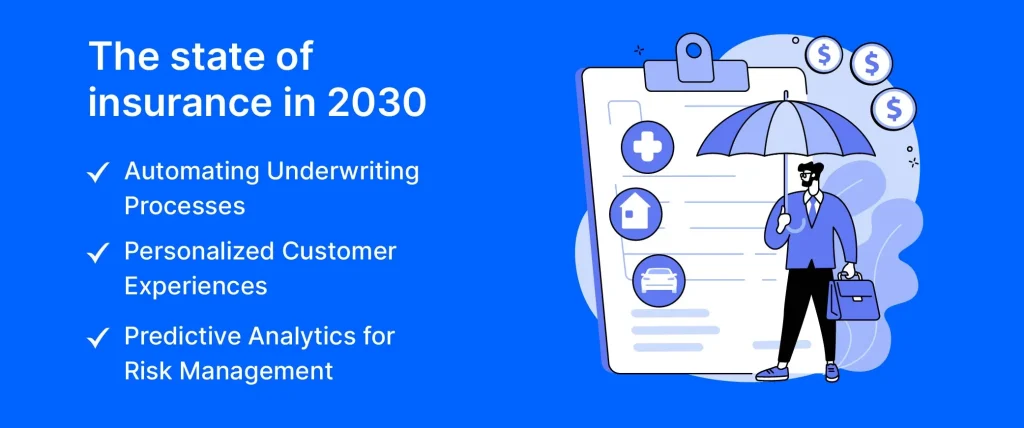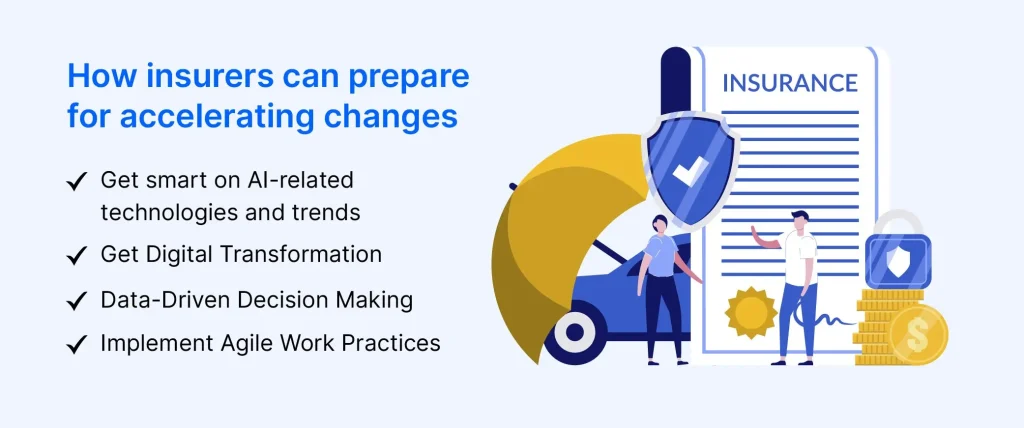When teams operate independently, it creates communication gaps that can lead to disorder. In contrast, when teams collaborate, they tend to be more efficient.
In an era defined by rapid technological advancements, the insurance industry finds itself at the forefront of transformation, thanks to the burgeoning influence of Artificial Intelligence (AI). Both regulators and insurance companies are rapidly realizing the potential of artificial intelligence to propel the sector forward, whether it is through improved operational efficiencies, more precise market distribution, accelerated new offering development, or predictive modeling. Machine learning in insurance is driving innovation by analyzing vast datasets to enhance risk prediction models, optimize pricing strategies, and ultimately improve overall industry efficiency.
The emergence of ChatGPT and other generative AI tools, along with new AI-enabled models, has made insurance companies more efficient in handling laborious manual operations. One example is the mining and processing of enormous amounts of numerical and language-based data through the use of machine learning and other AI skills. This blog explores the evolving landscape of the insurance sector as it embraces AI technologies to enhance efficiency, mitigate risks, and redefine customer experiences. AI in insurance solutions streamlines claim processes, reducing turnaround time and enhancing customer satisfaction.
The basic technologies of AI are currently in use in our homes, workplaces, cars, and even on our bodies. The disruption caused by COVID-19 caused insurers’ digitalization to accelerate dramatically, which altered the adoption timetables for AI. Organizations have to make adjustments almost immediately to support remote workforces, modernize their web platforms, and increase their digital capabilities for distribution. Even if the majority of enterprises probably didn’t make significant investments in AI during the epidemic, they will be in a better position to do so now that digital technologies are being prioritized more and people are being more open to change. Insurers are increasingly leveraging AI in insurance underwriting to analyze vast datasets, improving risk assessment accuracy. Moreover, AI auto insurance is transforming the industry landscape, improving underwriting accuracy, expediting claims handling, and ultimately providing more personalized and efficient services to policyholders.

Sensor-equipped equipment has long been commonplace in industrial settings, but in the upcoming years, there will be a significant surge in the number of linked consumer products. Along with new, expanding categories like apparel, eyeglasses, home appliances, medical devices, and shoes, the penetration of current products (including automobiles, fitness trackers, smartwatches, smartphones, and home assistants) will continue to rise quickly. By 2025, experts predict that there will be up to a trillion connected gadgets.2. Carriers will be able to better understand their customers thanks to the deluge of fresh data generated by these devices, which will lead to the creation of new product categories, more individualized pricing, and service delivery that is happening in real-time. Automation in the insurance industry is streamlining processes and improve customer experiences using AI.
Implementing AI for insurance enables companies to pull advanced algorithms and data analytics, for more effective and efficient operations. Recent years have witnessed several remarkable advancements in the field of robotics, and these developments will continue to alter how people interact with their environment. Future commercial insurance goods and manufacturing processes will be drastically altered by additive manufacturing, also referred to as 3-D printing. 3-D printed structures will be widely used by 2025, therefore carriers will need to consider how this development would affect risk assessments. AI in insurance analytics empowers insurers with predictive insights, enabling proactive risk management strategies.
Furthermore, in the next ten years, upgraded surgical robots, autonomous farming equipment, and programmable drones will all be economically feasible. By 2030, a far higher percentage of regular cars will be equipped with autonomous characteristics like self-driving cars. Carriers must comprehend how the growing prevalence of robotics in various businesses and daily life will alter risk pools and customer expectations.
Open-source protocols will appear as data becomes more commonplace, ensuring that it may be shared and utilized in a variety of businesses. Together, different public and private organizations will form ecosystems to exchange data for a variety of use cases inside a unified cybersecurity and regulatory framework. Wearable data, for instance, may be transferred straight to insurance companies, and data about connected homes and cars might be made available via several consumer gadget makers, Amazon, Apple, and Google.
Artificial Intelligence (AI) stands at the forefront, revolutionizing underwriting processes, risk assessment, and customer interactions. Predictive analytics and automation redefine claims processing, expediting settlements and enhancing customer satisfaction. With the integration of blockchain, transparency and security reach new heights, curbing fraud and streamlining policy management. Personalized insurance experiences, facilitated by AI-driven insights, become the norm, fostering stronger insurer-policyholder relationships. The integration of AI chatbots in insurance enhances customer interactions, providing instant support and personalized assistance. The AI insurance industry in 2030 embodies a harmonious fusion of data-driven decision-making and innovative technologies, ensuring resilience, adaptability, and a customer-centric focus in an ever-evolving landscape. As a result, insurers navigate the complexities of risks with greater precision, anticipating trends, and embracing a future where technology propels the industry to unprecedented heights.

One of the most noticeable impacts of AI in the insurance industry is the automation of underwriting processes. Machine learning algorithms analyze vast datasets, enabling insurers to make more accurate risk assessments. This not only expedites the underwriting process but also minimizes human errors, leading to more precise policy pricing and better risk management.
AI empowers insurers to delve into the realm of personalized customer experiences. Chatbots and virtual assistants powered by AI provide real-time assistance, addressing customer queries, and guiding them through the intricacies of insurance products. Personalized recommendations and targeted communication foster stronger customer relationships and satisfaction.
AI’s prowess in predictive analytics revolutionizes risk management in the AI insurance sector. By analyzing historical data and identifying patterns, insurers can predict potential risks and frauds. This proactive approach not only minimizes losses but also allows for the development of more robust risk mitigation strategies.
Deep learning, automation, and external data ecosystems will all be widely adopted and integrated, driving the industry’s rapid transformation. Although it is impossible to foresee exactly what AI in insurance will look like in 2030, carriers can start preparing for change today by taking a few actions.

Even if the industry’s seismic changes will be tech-related, the IT team is not responsible for handling them. Rather than wasting time and money on other things, board members and customer experience teams should take the time to have a thorough understanding of these AI-related technologies. Investigating hypothesis-driven scenarios will be necessary as part of this endeavor to identify potential disruption sites, times, and effects on specific business lines. For instance, insurers are unlikely to learn much from small-scale IoT pilot initiatives in certain business units. Rather, they need to move forward with a goal in mind and a comprehension of how their company could be involved in the IoT ecosystem on a large scale. Proof-of-concept (POC) and pilot projects must be planned to test more than just how a technology works.
Insurers should invest in comprehensive digital transformation strategies. This involves adopting cutting-edge technologies such as AI, machine learning, and automation to streamline processes, enhance customer experiences, and improve overall operational efficiency. AI in insurance fraud detection algorithms plays a crucial role in identifying anomalies and patterns indicative of fraudulent activities.
Harness the power of data analytics to make informed decisions. Utilize predictive analytics for risk assessment, fraud detection, and customer behavior analysis. Data-driven insights enable insurers to stay ahead of market trends and evolving risks.
Embrace agile methodologies to foster flexibility and responsiveness within the organization. Agile practices enable insurers to adapt quickly to changing market dynamics, implement innovations rapidly, and deliver value to customers more efficiently.
As the AI insurance industry embraces the transformative potential of Artificial Intelligence, it’s clear that the impact is far-reaching and dynamic. The journey has just begun, and the synergy between AI and the insurance industry holds the promise of a more efficient, customer-centric, and secure future. IntellicWorks specializes in providing modern AI development services, offering customized solutions that harness the power of artificial intelligence to propel businesses into the future. From automating processes to offering personalized experiences and revolutionizing risk management, AI is reshaping the insurance landscape. Companies that strategically integrate AI into their operations are not only adapting to the evolving industry but are also positioned to lead the way into a future where technology and insurance seamlessly converge.
Let's Build Your Intelligent Future Using AI Development Services Together!
Follow IntellicoWorks for more insights!

Talk to us and let’s build something great together
A Subsidiary of Vaival Technologies, LLC
IntelliCoworks is a leading DevOps, SecOps and DataOps service provider and specializes in delivering tailored solutions using the latest technologies to serve various industries. Our DevOps engineers help companies with the endless process of securing both data and operations.
Ops
Cloud
AI & ML
Copyrights © 2023 byIntellicoworks. All rights reserved.